Nearly 100 global anti-hate experts gathered in Pittsburgh, PA, for the first Eradicate Hate Global Summit last week and I was honored to be among them to present the work of Not In Our Town and excerpts from our upcoming film Repairing the World. The Summit, attended by 500 people in person and nearly 1,000 online, was born out of the Tree of Life massacre that took place in Pittsburgh in October 2018, resulting in the largest loss of life in an anti-Semitic event in U.S. history.
Watch videos from the summit sessions at the Eradicate Hate Summit YouTube Channel.
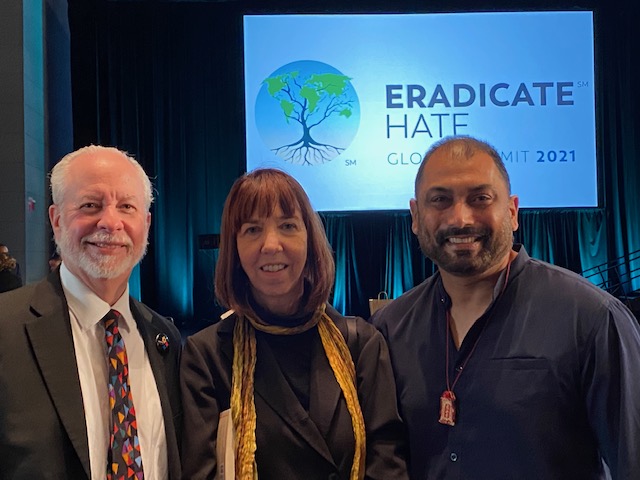 |
|
Rabbi Jeffrey Myers, Patrice O'Neill and Pardeep Kaleka at the Eradicate Hate Summit.
|
The first ever Eradicate Hate Summit began with an introduction and grounding in the story and perspectives of those who were deeply affected by the attack on three congregations in the Tree of Life synagogue. They included Rabbi Jeffrey Myers, the spiritual leader of Tree of Life, and Michele Rosenthal, who lost her brothers when a white supremacist gunman entered the synagogue with an AR-15. David and Cecil Rosenthal were among the eleven people whose lives were taken on October 27, 2018.
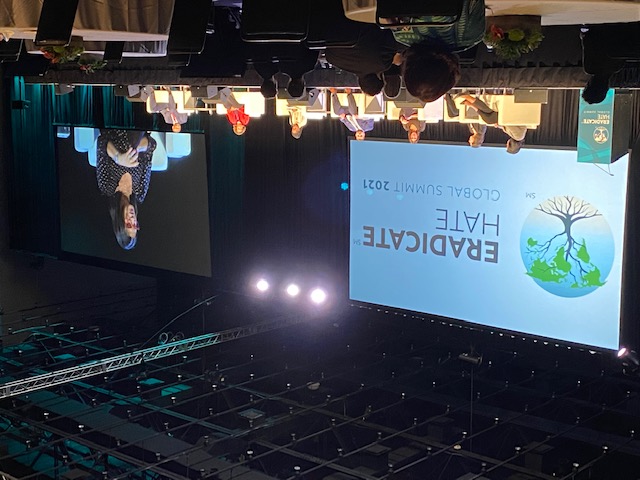 |
|
Tanya Gersh of Whitefish, MT, a victim of cyberattacks and death threats by white supremacists, spoke about the toll it took on her family, the tremendous support she received from her community, and the victorious lawsuit against her attackers filed on her behalf by SPLC.
|
The Summit was conceived and convened by Laura Ellsworth, partner-in-charge of Global Community Service Initiatives at Jones Day Law Firm, and Mark Nordenberg, chancellor emeritus and chair of the Institute of Politics, University of Pittsburgh. Both of these leaders became deeply engaged in leveraging their resources and the power of Pittsburgh in a long range effort to seek solutions to the rising threat of hate. The organizers "have resolved to convert what happened into the most significant anti-hate rule of law initiative in the world and, to that end, bring together multi-disciplinary global experts and leaders who are committed to the eradication of hate speech and violent extremism—in all its forms —around the world."
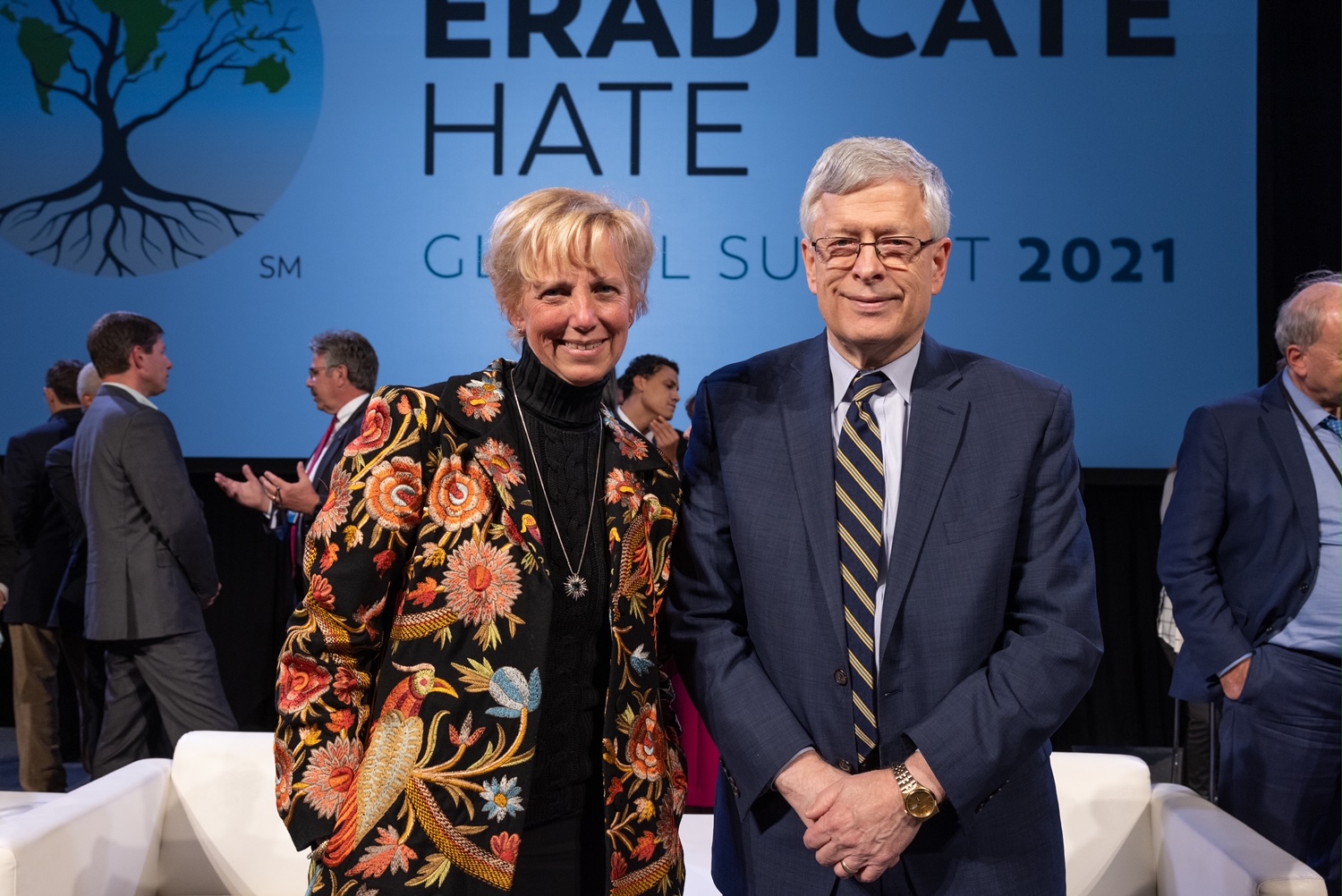 |
|
Global Eradicate Hate Summit organizers Laura Ellsworth and Mark Nordenberg. (Photo by Josh Franzos)
|
It was a transformative convening at a pivotal moment. I was honored to present to and learn from an incredibly distinguished list of speakers, including data specialists who are tracking multiple kinds of hate across the world; researchers who provided context and made the connections from the attacks in Pittsburgh to later attacks in New Zealand, El Paso, and beyond; experts in violent extremism who outlined the threat of different groups and the distinct political and legal responses to counter them; legal experts who explained the tools we have to prosecute offenders; and experts from various disciplines — technology, deradicalization, history, and community preparedness and response.
It's an important first step in identifying how we can use the rule of law, science and technology to counter an ever-evolving global threat.
One of the most powerful sessions featured the families of hate crime victims speaking about how they are using their voices now on behalf of their loved ones to help people understand the consequences of hate, racism and anti-Semitism, and all forms of hate fueled violence.
|
Dawn Collins and her husband Rick Collins spoke about their son Lt. Richard Collins III who was killed by a white supremacist at the University of Maryland in the Spring of 2017. Dawn and Rick, both from military families, have become warriors on behalf of hate crime victims.
|
The Role of Art in Combatting Hate
I spoke on a panel about the role that art and culture can play in our collective re-imagining of more inclusive communities. The panel was moderated by Hayley Haldeman, attorney and former executive director and board member of the Mattress Factory, an Arts Center in Pittsburgh. Panelists included Susan Margolin and Trish Adlesic, who are producing a film called Tree of Life Film that is focused on victim and witness perspectives. Laurie Zittrain Eisenberg spoke about the art exhibit she helped develop outside the Tree of Life synagogue. Laurie is helping to catalogue thousands of artifacts that were left at the synagogue as a tribute to the 11 people who were killed.
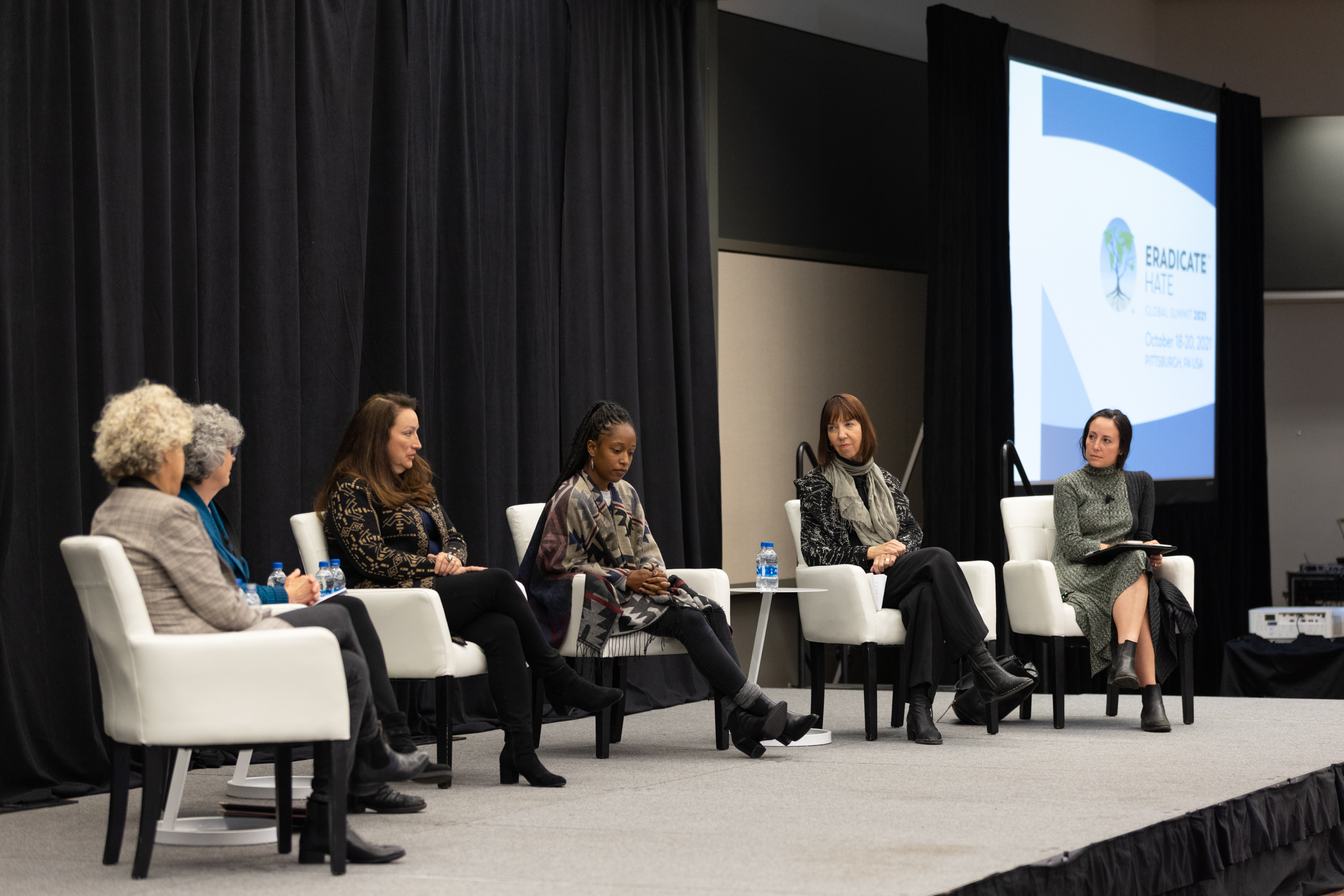 |
|
Panel: The Role of Art in Combatting Hate (Photo by Josh Franzos)
|
Another panelist, Taylor Dumpson, an attorney and artist, was the victim of a hate crime when she became the first Black woman student body president at American University. Taylor presented her paintings and spoke about how her artwork helped her process the trauma of the attack. I presented a trailer from our upcoming film, Repairing the World, and talked about how we have used film in our work at Not In Our Town to strengthen community relationships, to deepen shared empathy and mutual recognition of humanity across identities.
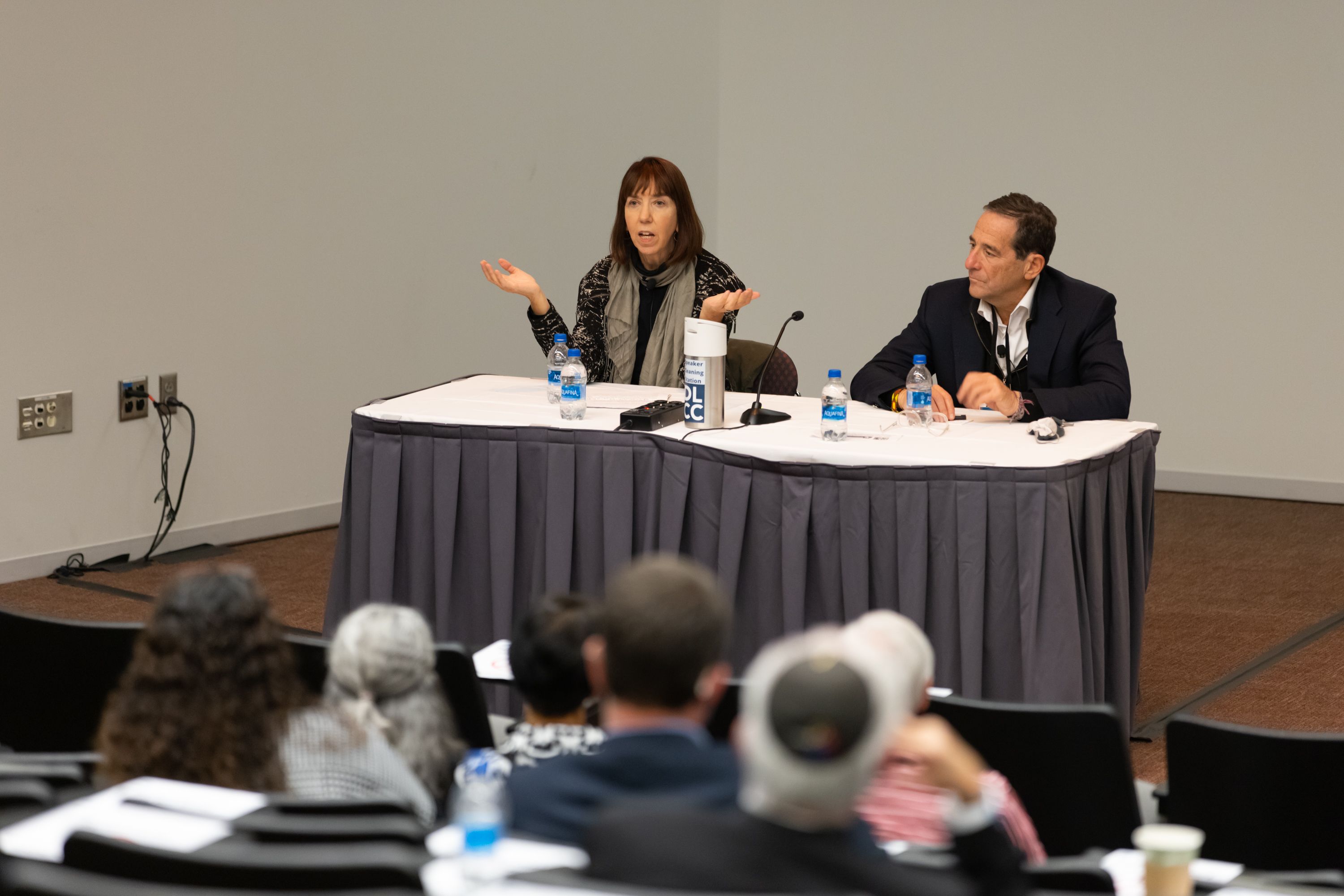 |
|
Patrice and Robert Rosenthal, distinguished journalist and editor, and former executive director and board member of the Center for Investigative Reporting. (Photo by Josh Franzos)
|
In another session, I was joined by journalist and editor Robert Rosenthal. Robert is the the former executive director and current board member of the Center for Investigative Reporting. We discussed some of the issues explored in our upcoming film, Repairing the World. We presented clips from the film and discussed how the community of Pittsburgh has wrestled with complex issues in countering hate speech and building solidarity between the Jewish community, Muslims, immigrants and the Black community in Pittsburgh. At both panels, we were joined by family members of the Tree of Life victims including the Mallinger-Wedner families, Michele Rosenthal, Carol Black, sister of Richard Gottfried, Rabbi Myers and other Pittsburgh leaders who appear in the film.
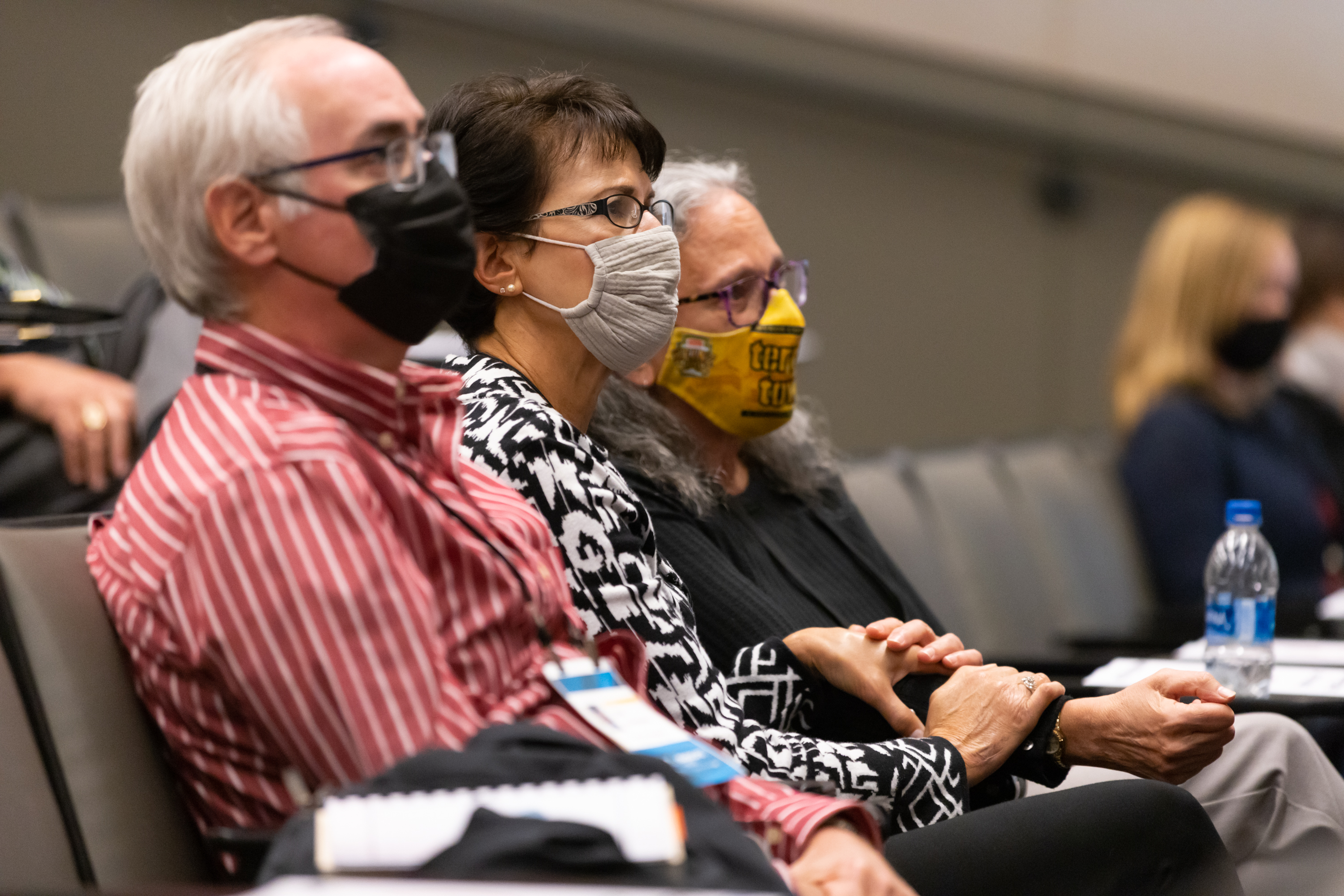 |
|
Ron Wedner, Andrea Wedner and Carol Black watching clips from the upcoming Not In Our Town film. Andrea's mother Rose Mallinger was killed at the synagogue and she was injured. Carol Black was in the building during the attack, and lost her brother Rich Gottfried. (Photo by Josh Franzos)
|
A distinguishing feature of the Summit is that it was not designed as single conference. Rather, the October event is the launch of an ongoing project, with a permanent home in Pittsburgh, which will generate specific solutions, not merely dialogue. The ongoing work to create this “translational research” arm of the anti-extremism field will occur under the auspices of the multi-disciplinary Collaboratory Against Hate – Research and Action Center, a joint project of Carnegie Mellon University and the University of Pittsburgh. The Collaboratory is led by Lorrie Cranor at Carnegie Mellon and Dean Kathleen Blee, who has spent years researching hate groups, at the University of Pittsburgh.
The organizers "intent is to drive deliverable solutions, by bringing together the best and the brightest from around the world and providing an ongoing Working Group structure that continually incentivizes those experts to work collaboratively across disciplines, across institutions, and across borders between each annual gathering, to deliver actual, lasting, and measurable change. At each annual Summit, the Working Groups will present the results of their year-long work and will plot the specific ongoing work for the year to come."
I am so honored to participate in this vital endeavor. Please visit their website to learn more about the Summit and their continuing work.
Add new comment